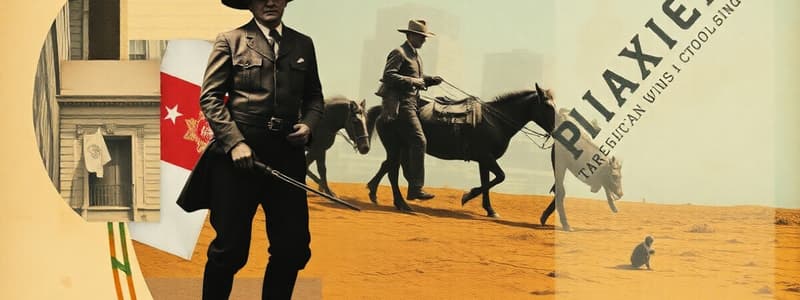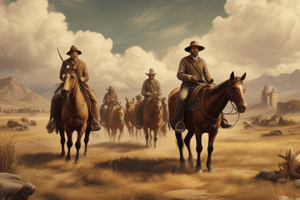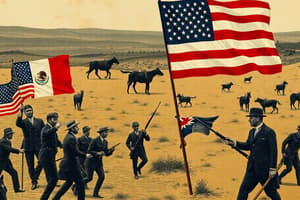Podcast
Questions and Answers
What was the primary motivation for economic westward expansion during the Manifest Destiny period?
What was the primary motivation for economic westward expansion during the Manifest Destiny period?
- Religious freedom
- Desire for political power
- Establishment of military bases
- Search for land and resources (correct)
How did Romanticism in art influence the American ideal of westward expansion?
How did Romanticism in art influence the American ideal of westward expansion?
- It portrayed westward movement as dangerous and reckless.
- It focused on urban life and industrial growth.
- It discouraged migration due to its emphasis on societal stability.
- It emphasized nature and individualism as a quest for freedom. (correct)
Which party was more cautious about expansion during the mid-1800s?
Which party was more cautious about expansion during the mid-1800s?
- Democratic Party
- Whig Party (correct)
- Libertarian Party
- Federalist Party
What was a significant result of the election of 1844?
What was a significant result of the election of 1844?
What did the Wilmot Proviso aim to accomplish in relation to new territories?
What did the Wilmot Proviso aim to accomplish in relation to new territories?
How did the Fugitive Slave Act of 1850 influence Northern sentiments about slavery?
How did the Fugitive Slave Act of 1850 influence Northern sentiments about slavery?
What was the purpose of John Brown's raid on Harper's Ferry?
What was the purpose of John Brown's raid on Harper's Ferry?
What term describes the idea that settlers in a territory should decide whether to allow slavery?
What term describes the idea that settlers in a territory should decide whether to allow slavery?
What was the main outcome of the Supreme Court's ruling in the Dred Scott case?
What was the main outcome of the Supreme Court's ruling in the Dred Scott case?
What distinguished abolitionists from anti-slavery/free soil proponents?
What distinguished abolitionists from anti-slavery/free soil proponents?
What change occurred among the major political parties in the 1850s?
What change occurred among the major political parties in the 1850s?
Which stance did John Bell take regarding slavery in the 1860 presidential election?
Which stance did John Bell take regarding slavery in the 1860 presidential election?
How did the Caning of Charles Sumner impact national politics?
How did the Caning of Charles Sumner impact national politics?
What was Lincoln's significant break from previous elections when he became president?
What was Lincoln's significant break from previous elections when he became president?
What was a key similarity motivating both Confederate and Union soldiers during the Civil War?
What was a key similarity motivating both Confederate and Union soldiers during the Civil War?
What was the main purpose of the Freedmen's Bureau?
What was the main purpose of the Freedmen's Bureau?
What restrictions did the Tenure of Office Act impose on the president?
What restrictions did the Tenure of Office Act impose on the president?
Which advantage did the Union possess during the Civil War?
Which advantage did the Union possess during the Civil War?
What was the fundamental goal of 'hard war' tactics employed by Union commanders?
What was the fundamental goal of 'hard war' tactics employed by Union commanders?
What did the Emancipation Proclamation achieve?
What did the Emancipation Proclamation achieve?
How did Andrew Johnson's background differ from that of Abraham Lincoln?
How did Andrew Johnson's background differ from that of Abraham Lincoln?
What were the overall goals of Black Codes enacted in the South?
What were the overall goals of Black Codes enacted in the South?
Flashcards
Wilmot Proviso
Wilmot Proviso
Proposal to ban slavery in territories won from Mexico.
Compromise of 1850
Compromise of 1850
Agreement to address slavery in newly acquired territories.
Fugitive Slave Act
Fugitive Slave Act
Law demanding return of runaway slaves to the South.
Popular Sovereignty
Popular Sovereignty
Signup and view all the flashcards
Bleeding Kansas
Bleeding Kansas
Signup and view all the flashcards
Kansas-Nebraska Act
Kansas-Nebraska Act
Signup and view all the flashcards
Mexican-American War Causes
Mexican-American War Causes
Signup and view all the flashcards
Manifest Destiny
Manifest Destiny
Signup and view all the flashcards
Dred Scott Decision
Dred Scott Decision
Signup and view all the flashcards
Abolitionists vs. Free-Soil
Abolitionists vs. Free-Soil
Signup and view all the flashcards
1850s-60s Party Changes
1850s-60s Party Changes
Signup and view all the flashcards
1860 Presidential Candidates
1860 Presidential Candidates
Signup and view all the flashcards
"Draw a line.Work out a solution."
"Draw a line.Work out a solution."
Signup and view all the flashcards
Caning of Charles Sumner
Caning of Charles Sumner
Signup and view all the flashcards
Lincoln's Election & Secession
Lincoln's Election & Secession
Signup and view all the flashcards
Confederate Secession Arguments
Confederate Secession Arguments
Signup and view all the flashcards
Union/Confederate Soldier Motives
Union/Confederate Soldier Motives
Signup and view all the flashcards
Black Men in the North
Black Men in the North
Signup and view all the flashcards
Emancipation Proclamation
Emancipation Proclamation
Signup and view all the flashcards
Lincoln's Confederate View
Lincoln's Confederate View
Signup and view all the flashcards
Hard War Tactics
Hard War Tactics
Signup and view all the flashcards
Union/Confederate Advantages
Union/Confederate Advantages
Signup and view all the flashcards
Study Notes
Westward Expansion and the Mexican-American War
- Economic factors fueling westward expansion: search for land, resources, farming, and mining opportunities.
- Romanticism's influence: emphasized nature and individualism, promoting westward migration as a freedom quest.
- Democratic Party stance: supported expansion; Whig Party was more cautious or opposed.
- Election of 1844 impact: James K. Polk's victory championed Texas annexation and expansion into Oregon and California.
- Causes of the Mexican-American War: border disputes, American expansionism, and Mexico's refusal to negotiate.
- Lincoln's "spot resolutions": questioned war justification, reflecting anti-war sentiment.
- Thoreau's protest: civil disobedience through tax refusal.
1850s Issues and the Road to Civil War
- Wilmot Proviso: proposed banning slavery in Mexican territories; intensified sectional conflict.
- Compromise of 1850: California's admission as a free state, stricter Fugitive Slave Act, and popular sovereignty for other territories.
- Fugitive Slave Act: required runaway slave return; enraged Northerners and fueled abolitionist views.
- California Gold Rush and Southern opposition: Southern migrants feared a free California reducing their political power.
- Kansas-Nebraska Act: allowed popular sovereignty for slavery in the territories.
- Popular sovereignty: settlers deciding on slavery.
- Bleeding Kansas: violent conflict over slavery, John Brown's involvement.
- John Brown's Harper's Ferry raid: aimed to incite slave rebellion.
- Dred Scott decision: ruled African Americans as non-citizens and Congress couldn't ban slavery.
- Abolitionists vs. Free Soilers: abolitionists advocated for ending slavery everywhere; Free Soilers opposed its expansion, but not immediate abolition.
- Changing political landscape: Whigs declined; Republican Party emerged against slavery expansion.
- Presidential candidates of 1860: differing views on slavery and the Union:
- Lincoln: opposed slavery expansion.
- Douglas: supported popular sovereignty.
- Breckenridge: supported slavery expansion.
- Bell: wanted Union preservation.
- Pre-Civil War approach to slavery: seeking compromises like the Missouri and 1850 Compromises to avoid conflict.
- Caning of Charles Sumner: physical attack; heightened sectional tensions and favored the Republicans in the 1856 election.
Civil War
- Lincoln's 1860 election and secession: Southern fears about slavery's future led to secession; Lincoln's victory marked a shift from previous elections.
- Southern secession justification: asserting the right to leave the Union to protect slavery and state's rights.
- Union/Confederate soldier motivations: both fought for honor and duty, but Union soldiers aimed for Union preservation, Confederates for states' rights and slavery.
- Black men's military service: opportunity for fighting for freedom and equality.
- Emancipation Proclamation: freed enslaved people in Confederate states; limited to Confederate areas.
- Preservation of the Union: Lincoln's insistence that the Confederacy was in rebellion; refusal to recognize them as a distinct country.
- "Hard war" tactics: total war by Union commanders (Grant, Sherman) via aggression, resulting in civilian suffering.
- Union/Confederate military advantages: Union had more resources and manpower; Confederacy had better military leadership and local knowledge.
Reconstruction
- Lincoln's Reconstruction plan: lenient approach to reintegrate the South, differing from Radical Republicans and Johnson's.
- Freedmen's Bureau: provided assistance for freedmen (education, healthcare, etc.).
- Andrew Johnson's background: Southern Democrat and former slave owner, contrasting with Lincoln's nationalistic stance.
- Black Codes: laws restricting African American rights to maintain a labor force.
- Tenure of Office Act: restricted presidential power to remove officials; instrumental in Johnson's impeachment.
- 1876 election outcome: Rutherford B. Hayes won under a disputed electoral commission amidst voter fraud and contestations.
Studying That Suits You
Use AI to generate personalized quizzes and flashcards to suit your learning preferences.
Description
Explore the events leading to the Mexican-American War and the impact of westward expansion in America. This quiz covers key economic, political, and social factors such as Romanticism and party politics, alongside pivotal moments like the Wilmot Proviso and the Compromise of 1850. Test your knowledge on how these elements influenced the road to the Civil War.




